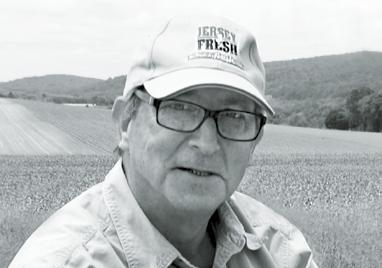
3 minute read
U.S. National Arboretum Offers Solution to Hemlock Woolly Adelgid Pest
Hemlocks, Tsuga species, are evergreen trees that can be found in forested ecosystems and in landscape plantings. They are in the pine family and often assume a conical shape. Hemlocks are not poisonous and may even be used as Christmas trees during the holiday season.
Unfortunately, hemlocks in the U.S. are vulnerable to attack by a small insect called the hemlock woolly adelgid (HWA). This insect looks like tiny cotton balls on the needles of the tree and can kill the trees by feeding on the sap. The adelgid has decimated stands of hemlocks in the eastern U.S. While insecticides and biological control measures can offer some relief, the best way to combat HWA is to develop genetic resistance in the trees.
To address this agricultural challenge, USDA-ARS researchers at the U.S. National Arboretum, led by Horticulturist Susan Bentz, developed hybrids between the native (susceptible) Carolina hemlock and a resistant Asian species, Tsuga chinensis. Two of these hybrids, Tsuga ‘Traveler,’ and Tsuga ‘Crossroad’ – were recently released to the nursery industry. Both have resistance to HWA and have outstanding ornamental and growth characteristics, including symmetrical, upright habits. These hybrid hemlocks are the first to be introduced to the horticultural trade and represent new strategies for managing HWA in landscape settings.
“This has been a long-term project that utilized the Arboretum’s horticultural, scientific, germplasm and collaborative resources,” said Susan Bentz. “We are excited to have developed a sustainable approach to this problem.” without much more thought than knowing you are doing the right things.
Both ‘Traveler’, now patented, and ‘Crossroad’ are hardy in U.S. Department of Agriculture Zones 6 and 7 and will perform well in moist, well-drained soil in full sun to partial shade. These cultivars can be clonally propagated by cuttings taken in December or January or in early summer. Rooting occurs slowly and the resulting plants transplant well from containers into the landscape.
Propagating nurseries interested in ‘Traveler’ or ‘Crossroad’ should contact usna.comments@usda.gov for more information.
Editor’s Note: The Agricultural Research Service is the U.S. Department of Agriculture’s chief scientific in-house research agency. Daily, ARS focuses on solutions to agricultural problems affecting America. Each dollar invested in U.S. agricultural research results in $20 of economic impact.
Making compost with kitchen scraps and lawn waste, collecting rainwater in barrels, planting rare seeds and native plants, developing butterfly gardens, reusing glass clippings, developing habitat for nesting birds. See what I mean? All these actions can change the world, one spade, one blade, one bug, one bird at a time.
Forget all the naysayers, blame-throwers, and deniers, and just do
Instead, think, “Do I use reusable bottles and eschew oneuse plastics when possible? Do I recycle whenever I can? Do I use recyclable grocery bags (YES, especially now in New Jersey)? Do I walk more? (Good for you, good for the environment.) Have
I really worked on wasting less food?”
Anne Frank may have put it best when she said, “How wonderful it is that nobody need wait a single moment before starting to improve the world.”
And think of what President John F. Kennedy added: “Every person can make a difference and every person should try.”
Leave it to the man whose name is synonymous with genius, Albert Einstein, who posited, “I wish to do something Great and Wonderful, but I must start by doing the little things like they were Great and Wonderful.”
Editor’s Note: Douglas H. Fisher is New Jersey’s Secretary of Agriculture. He is the department’s executive officer, secretary to the State Board of Agriculture and a member of the Governor’s cabinet. Secretary Fisher fulfills executive, management and administrative duties prescribed by law, executive order or gubernatorial direction. He can be reached at 609.292.3976. For more info, please visit: http:// www.state.nj.us/agriculture

Draft assessment titled “Evaluation of non-Buxus plants as hosts of the box tree moth, Cydalima perspectalis
Walker (Lepidoptera: Crambidae)” is available for public comment
USDA APHIS has developed a draft assessment to determine the hosts of box tree moth (Cydalima perspectalis). On May 26, 2021, APHIS issued a Federal Order amending the entry requirements for the importation of boxwood (Buxus spp.), Euonymus spp., and holly (Ilex spp.) plants for planting from Canada to prevent introduction of box tree moth into the United States. The purpose of this assessment is to critically examine associations of the box tree moth with non-Buxus plants reported in the literature. This document will be used to update restrictions for nursery plants that could serve as pathway of introduction for box tree moth. APHIS is sharing the draft assessment to determine whether stakeholders have information that might lead us to revise the assessment before we update our requirements for hosts of box tree moth.
The draft assessment will be available for review and comment until April 6, 2023. To view the assessment or submit comments, go to https://www.aphis.usda.gov/plant-health/risk-assessmentconsultation.





